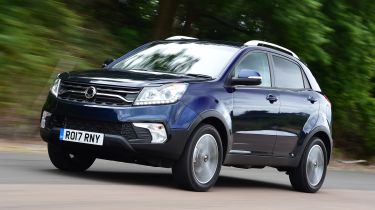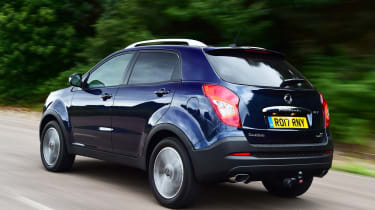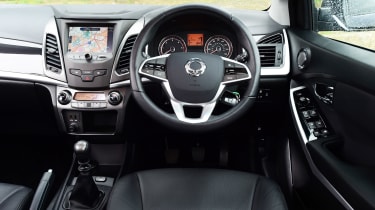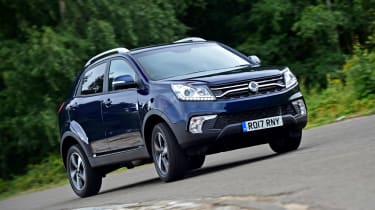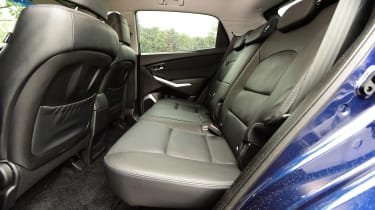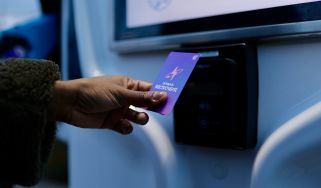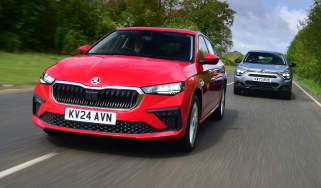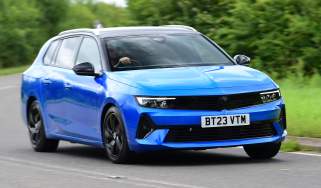SsangYong Korando (2010-2019) review
The SsangYong Korando is a compact crossover that offers a lot of car for your money, but more accomplished rivals offer better value
You may not be familiar with either the SsangYong or Korando names, but the company is Korea's oldest car maker and this is the third generation of the car, which has been on sale in the UK since 2011. It started life with a 2.0-litre diesel engine, but that was superseded by a 2.2-litre unit in 2016 – bringing more power and better economy – and a 2.0-litre petrol engine has been added to the range as a cheap, entry-level model.
The model you see here was updated in 2017, with subtle changes inside and outside. Most obvious are the revised grille and headlights, accompanied by LED daytime running lights, which mean that the Korando adopts the 'family' look first seen on the Tivoli.
One of its main atttactions is the high towing capacity, but it's also a lot of car for the money, with plenty of space inside – for passengers and luggage alike – and lots of equipment. Every model comes with iPod & Bluetooth connectivity, air conditioning, tinted glass and roof rails, with extras such as front & rear parking sensors, a rear-view camera, 7-inch touchscreen and sat-nav all available on higher trim levels.
In addition to that, buyers can choose from both two- and four-wheel drive versions, as well as manual and automatic gearboxes.
More reviews
Car group tests
In-depth reviews
Long-term tests
Road tests
The SsangYong Korando is the South Korean firm's rival for the Nissan Qashqai, Kia Sportage and Ford Kuga, but it offers a lot more car for less cash. Standard equipment even on the entry-level model includes air-con, alloy wheels, all-round electric windows, Bluetooth connectivity and cruise control, while the top-spec models get heated leather seats, a rear-view camera and a 7-inch touchscreen. There are three models on offer, the SE (offered in front- or four-wheel drive), LE (two-wheel drive only) and the ELX, which is only available in four-wheel drive guise. Almost the entire range comes with a 2.2-litre diesel engine, but the cheapest model in the range combines a 2.0-litre petrol engine with SE trim and two-wheel drive.
Engines, performance and drive
One thing's for sure, you don't buy a Korando for driving thrills. It may have been the first SsangYong to use modern unitary construction, but the suspension fails to deliver a coherent performance. In corners, the Korando rolls alarmingly, yet the suspension fails to soak up the bumps.
To make matters worse, the 2.2-litre diesel engine sets a low bar for refinement and fuel economy. Mated to the notchy gearshift, vague steering and an un-accomplished low-speed ride, it means the current Korando is far from pleasant to drive.
At least, the engine is punchy, though. With 176bhp on tap, it delivers a respectable turn of pace when you dip the throttle, while the 400Nm of torque means that pound-for-pound the Korando still makes sense as a cheap tow car. In fact, SsangYong rates its towing capacity at an impressive two-tonnes, with a 750kg maximum for un-braked loads.
There is also a 2.0-litre petrol engine that powers the cheapest model in the range, but we haven't driven it. However, as far as we can see, on paper, the only attraction it has its low purchase price: in terms of its power, performance and fuel economy, it's well behind the diesel engine.
MPG, CO2 and Running Costs
You get a lot of car for your cash – in fact, the only option is metallic paint. Fuel economy and emissions are similar to rivals in the class, with the most economical combination being the diesel engine with two-wheel drive and a manual gearbox, which averages 53.3mpg. Adding four-wheel drive or an automatic gearbox drops the economy to 48.7mpg; and, if you have both, the fuel economy drops further still, to 40.9mpg. Least economical of the lot is the 2.0-litre petrol engine, which averages just 37.7mpg.
Insurance costs also look a little dear compared to what you'll pay on the Korando's rivals, but the main area where SsangYong buyers could lose out is when it comes to the time to sell on. As SsangYong isn't a common brand in the UK, residuals will be poor, although the standard five-year, unlimited-mileage warranty should help matters.
Interior, design and technology
There's been some major changes to the Korando over the years, as Ssangyong ramps up its fight against the UK's favourite crossovers. The front end gets a slimmed down, black-mesh grille, more modern headlights and lower and wider air intake, while the rear gets some redesigned light clusters. The Korando was facelifted once in 2013, but the company's designers gave it a further nip and tuck in 2017, although it was blink-and-you’ll-miss-it stuff. The exterior design has been tweaked with the introduction of a new grille design and new headlamp units, while the fog lamps have also been replaced.
Every model comes with alloy wheels, roof rails, twin chromed exhaust pipes and LED daytime running lights, but you'll need to step up from the basic SE trim to add a rear spoiler and diamond-cut alloys.
That may all sound pretty good, but park the SsangYong Korando next to a Kia Sportage or Hyundai ix35, and it still pales into the background and feels a few years behind its rivals.
Practicality, comfort and boot space
A relativley long wheelbase means there's plenty of space inside the Korando – there's space for three in the back, and the rear seats recline for added comfort. Reach and rake adjustment on the steering wheel means it's easy to get comfortable at the wheel, too. High-spec models get heated leather seats as standard, but all cars are let down by the hard, scratchy plastics and dated dashboard design.
ELX and LE cars get a seven-inch touchscreen infotainment system with sat-nav. Admittedly, it’s a small and basic unit, but it uses TomTom software for navigation and responds slickly to touch inputs, making it a welcome addition to the car’s basic interior.
One of the Korando's main attractions is that it has one of the biggest boots in the compact crossover class. At 486 litres, it has more than 70 litres more boot space than a Nissan Qashqai, although SsangYong has missed a trick by not adding a sliding function to the reclining rear seats. Standard rear parking sensors will help make the Korando easy to park, while the torquey engine will be well suited to towing. The Korando has maximum towing weights of 750kg (unbraked) and 2,000kg (braked) – but be warned that this drops to just 1500kg with the petrol-engined model.
Reliability and Safety
SsangYong is something of an unknown quantity when it comes to reliability, although the firm offers a five-year unlimited-mileage warranty to give some peace of mind. As part of the brand's relaunch, SsangYong is aiming to have 65 dealers across the country, although that means you may have to travel to get your car serviced.
All Korandos come with the same safety equipment as standard, which includes six airbags, ESP stability control and Isofix child seat fixings on the outer rear seats. However, there is no independent verification of the car's safety, as it hasn't been tested by Euro NCAP.
For an alternative review of the latest SsangYong Korando SUV visit our sister site carbuyer.co.uk
Which Is Best
Cheapest
- Name1.5 ELX 5dr
- Gearbox typeManual
- Price£20,615
Most Economical
- Name1.6 D Pioneer 5dr Auto
- Gearbox typeSemi-auto
- Price£25,440
Fastest
- Name1.6 D Pioneer 5dr Auto
- Gearbox typeSemi-auto
- Price£25,440
